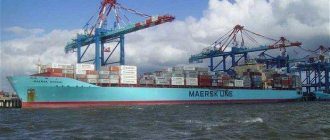ST 269 of the Criminal Code of the Russian Federation Lost force. — Federal Law of April 23, 2018 N 114-FZ. .
1. Violation of safety rules during the construction, operation or repair of main pipelines, if this act negligently resulted in the infliction of serious harm to human health, is punishable by restriction of freedom for a term of up to three years, or by forced labor for a term of up to two years with deprivation of the right to hold certain positions. or engage in certain activities for a term of up to three years or without it, or arrest for a term of up to six months, or imprisonment for a term of up to two years with deprivation of the right to hold certain positions or engage in certain activities for a term of up to three years or without it.
2. The same act, which through negligence resulted in the death of a person, is punishable by forced labor for a term of up to five years or imprisonment for the same term.
3. An act provided for in the first part of this article, which through negligence resulted in the death of two or more persons, is punishable by forced labor for a term of up to five years or imprisonment for a term of up to seven years.
Commentary to Art. 269 Criminal Code
1. The subject of the crime is main gas, oil and product pipelines. Main pipelines can transport oil, natural gas, petroleum products, petroleum and artificial hydrocarbon gases, liquefied hydrocarbon gases, unstable gasoline, liquid ammonia, etc. Main pipelines include the pipeline itself (from the point of exit of commercial products prepared for transport to places of processing and shipment of oil, consumption of petroleum products or their transshipment to another type of transport and sale of gas, including liquefied gas, to consumers) with shut-off valves; pipeline protection structures; signal signs for the location of pipelines; repair and maintenance points; tank farms; wastewater treatment plants; compressor and gas distribution stations; underground storage stations for gas, oil and petroleum products, etc. Other auxiliary pipelines, which are branches from the main pipeline, intended to deliver a specific product to consumers, are not the subject of this crime.
2. The objective side of the crime is expressed in the form of action or inaction. Violation of safety rules during the construction of main pipelines is a complete or partial failure to comply with established standards for the design, construction, strength and tightness testing of main pipelines; may be expressed in the use of steel pipes of the wrong class, etc. Violation of safety rules during the operation of main pipelines is a complete or partial failure to comply with the procedures established by the regulations for the safe use (in accordance with the operational characteristics) of main pipelines; may manifest itself in exceeding the maximum permissible pressure in the main pipeline, etc. Violation of safety rules when repairing main pipelines is a failure to comply with the procedure for carrying out work (operations) to eliminate malfunctions and restore full functionality of main pipelines in accordance with operational characteristics; may be expressed in poor-quality welding work during the repair of main pipelines, etc. A mandatory feature of the crime in question is the occurrence of socially dangerous consequences due to negligence: grave harm to human health (Part 1), death of a person (Part 2), death of two or more persons ( part 3). In this case, it is necessary to establish a cause-and-effect relationship between actions and socially dangerous consequences that occur.
3. The crime is recognized as completed from the moment the socially dangerous consequences specified in the law occur. If there are no consequences, the actions are qualified under Art. 11.20 Code of Administrative Offenses of the Russian Federation.
4. Special subject: a person who has reached the age of 16 and is directly involved in the construction, operation or repair of main pipelines or is responsible for the specified work.
Commentary on Article 269 of the Criminal Code of the Russian Federation
The main object of the crime is the safety of operation of main pipelines, an additional object is human life and health. The subject of the crime is main pipelines.
Trunk pipelines represent a specific type of transport. But this type of transport constitutes a complex of land, underground, overground, and underwater pipelines, as well as production and technological facilities intended for the transportation of oil, natural gas, petroleum products, petroleum and artificial hydrocarbon gas, liquefied petroleum gases, unstable gasoline and condensate, as well as other products. This transportation is carried out from the point of acceptance to the points of delivery, storage, processing, and transshipment to another type of transport.
From the perspective of the components of the main pipeline system (buildings, structures, equipment, etc.), it is very complex and diverse. It includes, in particular:
— pipeline (from the point of exit of commercial products prepared for transport to places of oil refining and shipment, consumption of petroleum products or their transshipment to another type of transport and sale of gas, including liquefied gas, to consumers) with branches and loopings, shut-off valves, transitions through natural and artificial obstacles, connection units for pumping and compressor stations, units for starting and receiving treatment and diagnostic devices, units for measuring the quantity of products, condensate collectors, devices for introducing hydrate inhibitors, units for releasing products or purging a gas pipeline;
— compressor and gas distribution stations;
— underground storage stations for gas, oil and petroleum products;
— automobile gas filling stations;
— installations for electrochemical protection of pipelines from corrosion, lines and structures for technological communication, pipeline telemechanics, etc.
A complete list of main pipeline components is given in the Rules for the Protection of Main Pipelines (approved by the Ministry of Fuel and Energy of Russia on April 29, 1992, by Resolution of the State Mining and Technical Supervision Authority of Russia dated April 22, 1992 N 9).
Pipelines are considered high-risk objects. Their danger is determined by a combination of hazardous production factors of the pumping process and hazardous properties of the pumped medium. In this regard, the construction, operation and repair of main pipelines must be carried out under conditions of increased safety. In addition, regulatory legal acts provide for the creation of pipeline security zones.
Any work and actions carried out in the security zones of pipelines, except for repair and restoration and agricultural work, can only be carried out upon receipt of permission to carry out work in the security zone of the main pipeline from the pipeline transport enterprise.
A permit to carry out work can be issued only if the work manufacturer has design and as-built documentation on which the existing pipelines are shown. The procedure for issuing a permit is established by the Rules mentioned above.
When deciding whether an act contains elements of a crime, attention should be paid to the conceptual apparatus used in legislation. In particular, the Criminal Code of the Russian Federation uses the term “main pipeline”. Other legislative acts use the concept of “main pipeline transport”. From the perspective of applying criminal law, these concepts should be considered as synonyms.
The objective side of the crime is characterized by such features as:
— an act in the form of a violation of safety rules committed during the construction, operation or repair of main pipelines;
- consequences in the form of careless infliction of serious harm to human health;
- a causal relationship between an act and a consequence.
Violations committed during the construction, operation or repair of auxiliary, storage facilities, and other types of pipelines do not entail criminal liability under this article. The disposition of the norm is blanket. To disclose the content of the objective side of the crime, it is necessary to refer to special rules for the construction, operation, and repair of main pipelines, for example, to the Resolution of the Gosgortekhnadzor of Russia dated December 9, 1998 N 73 “On approval of the Rules for the construction and safe operation of a main pipeline for the transportation of liquid ammonia” <1 >. An act can be committed either by action or by inaction.
——————————— <1> Rules for the construction and safe operation of the main pipeline for transporting liquid ammonia. M.: Gosgortekhnadzor of Russia, 2001.
Construction is the construction of main pipelines (both main and additional parts). Operation is the use of main pipelines for their intended purpose. Repairs include correction of damage, repairs, and replacement of failed parts.
The corpus delicti is material. The moment the crime ends is associated with the onset of consequences in the form of causing serious harm to human health.
The subjective side is characterized by a careless form of guilt in the form of frivolity or negligence.
A special subject of a crime is a person who takes part in the construction, operation or repair of main pipelines. This may be the person responsible for the safe operation of the facility, its construction or repair, as well as the person directly performing the relevant work.
In case of careless infliction of death on one or more persons during the commission of the same acts, liability arises according to Part 2 or Part 3 of Art. 269 of the Criminal Code of the Russian Federation.
Second commentary to Art. 269 of the Criminal Code of the Russian Federation
1. The subject of the crime is the main pipeline - a set of technical means for transporting oil, petroleum products, natural, petroleum and artificial hydrocarbon gases from the areas of their extraction, production or storage to places of consumption.
2. The construction of a main pipeline includes its construction, design, as well as strength testing and leak testing in accordance with the working design. Operation of a pipeline means using it for its intended purpose. Repair involves eliminating faults in the main pipeline. It is divided into current, capital and emergency recovery.
The crime is considered completed from the moment the criminal consequence occurs in the form of grievous bodily harm (see Art. 111 of the Criminal Code).
3. From the subjective side, the crime involves a careless form of guilt.
4. The subject of the crime is a person who has reached the age of 16 years.
5. Qualifying signs: the occurrence of human death (Part 2); the death of two or more persons (Part 3 of Article 269 of the Criminal Code).
Commentary on Article 269 of the Criminal Code of the Russian Federation
1. The main object of criminal encroachment is the safe operation of the main pipeline. Additional objects - health (part 1), life (parts 2, 3) of a person. An optional object is someone else's property.
2. Main pipeline - a technical structure through which the bulk of the transported substance (oil, petroleum products, natural gas, petroleum gas, etc.) moves. Other types of pipelines (auxiliary, supply to residential premises, warehouses, etc.) do not form the subject of this criminal attack. The subject of encroachment includes not only the pipeline itself, but also the structures that ensure its functioning (compressor stations, fire-fighting, anti-erosion and other structures and means, buildings and structures of pipeline operation services, pumping and loading pumping stations, etc.).
3. The objective side of the crime is expressed in: a) violation of safety rules during the construction, operation and repair of main pipelines; b) causing serious harm to a person’s health (Part 1) or deprivation of his life (Parts 2, 3); c) there is a causal connection between the violation of the relevant rules and the occurrence of the consequences specified in the law.
4. The disposition of the article is blanket. To understand the essence of the violation, it is necessary to refer to departmental regulations, for example, the Rules for the Technical Operation of Main Pipelines, the Rules for the Protection of Main Pipelines, etc. Violation of these Rules must be related to the construction, operation or repair of a main pipeline.
5. Construction is the design, construction, as well as testing for the planned strength and tightness of the pipeline.
6. Operation - functional use of the pipeline itself and its supporting structures.
7. Repair - elimination of malfunctions and damage to the pipeline and the structures that ensure its functioning. Repairs can be current, major or emergency repairs.
8. The rules for the construction, operation or repair of a pipeline are mandatory for persons involved in the field of main pipeline transport, as well as for persons of other enterprises and institutions, government bodies and local self-government, ordinary citizens carrying out work in the areas where the pipeline passes and the location of pipeline-servicing structures .
9. The elements of the crime are material in design. The crime is completed (by the elements) at the moment of causing serious harm to a person’s health (Part 1), as well as the death of a person (Part 2) or several persons (Part 3).
10. The general subject of a criminal offense is a sane individual who has reached the age of 16.
11. The subjective side of the crime is characterized by a careless form of guilt. Carelessness, in turn, can be expressed in frivolity or negligence.
12. Consequences in the form of causing death by negligence to one person (Part 2) and causing death by negligence to two or more persons (Part 3) form, respectively, qualified and especially qualified elements of crime.
13. The acts described in part 1 belong to the category of crimes of minor gravity, in parts 2 and 3 - of medium gravity.
AZ-libr.ru
Article 269. Violation of safety rules during the construction, operation or repair of main pipelines1. Violation of safety rules during the construction, operation or repair of main pipelines, if this act negligently resulted in the infliction of serious harm to human health,
- is punishable by restriction of freedom for a term of up to four years, or by arrest for a term of three to six months, or by imprisonment for a term of up to two years with or without deprivation of the right to hold certain positions or engage in certain activities for a term of up to three years.
2. The same act, which through negligence resulted in the death of a person,
- is punishable by imprisonment for a term of up to five years.
3. The act provided for in the first part of this article, resulting in the death of two or more persons through negligence,
- is punishable by imprisonment for a term of up to seven years.
Comm. Dubovik O.L.
1. General overview of the criminal law prohibition.
The article consists of three parts, in the first of which the main elements of the crime are formulated, in the second and third - qualified elements of different degrees of public danger. All compositions are material. There are no consequences in the form of harm to the environment in general, water bodies or its other components in particular. Nevertheless, the norms of Article 269 of the Criminal Code of the Russian Federation should be taken into account in cases where a violation of safety rules during the construction, operation or repair of main pipelines occurs on those sections that are directly located on water bodies or adjacent territories.
2. Scope, goals and addressees of the article.
It is designed for a fairly wide range of people, given that in the transportation of oil, gas, petroleum products, i.e. hydrocarbon raw materials and products made from them, water and other natural resources in our country, i.e. A large number of people are employed in the supply of raw materials. Trunk pipelines are assessed as sources of increased danger, penetrating a large territory, therefore their construction and operation also affect the interests of the population living near their location. Accidents on main pipelines, as a rule, cause significant damage to the environment: soil and water are polluted, forests and other vegetation may die, etc. In this regard, the article has preventive potential not only in terms of protecting human life and health, but also protecting the environment. Elimination of the consequences of violation of safety rules on main pipelines involves the expenditure of financial and other resources.
3. The object of the crime
are the life and health of people, as well as the procedure for activities in the field of use of main pipelines.
The literature suggests that the subject of the crime is the main pipeline and a complex of technical means and structures intended for moving (transporting) materials (pumping and compressor stations, storage tanks for materials, instrumentation, etc.). Let us note that the disposition of the article deals with the main pipeline, therefore, all violations that occurred on secondary branches will not be the subject of a crime and, in the absence of significant harm, will entail administrative or disciplinary liability1 {See.
Educational and practical commentary on the Criminal Code of the Russian Federation / Ed. A.E. Zhalinsky. - P.827.} .
4. Objective side.
It includes the act (action or inaction), consequences and the causal relationship between them. The procedure for the creation and operation of main pipelines is regulated by the Rules for the technical operation of main pipelines and the rules for the protection of main pipelines.
Construction of a main pipeline means its construction according to a project developed in advance and approved in accordance with the established procedure, taking into account the conclusions of an environmental assessment, an industrial safety assessment, and other conclusions. In this case, the stages preceding construction, such as design, placement, etc., are not distinguished. Nevertheless, it should be assumed that they (as well as the allocation of sites) are integral elements of the construction of the main pipeline and a violation of safety rules when placing (selecting a route), for example, in seismically unstable areas, or during design if the threats of floods and other natural phenomena and additional protection measures are not provided for by the project, must be qualified under Article 269 of the Criminal Code of the Russian Federation.
Operation of the main pipeline
means its use for transporting (pumping) gaseous, liquid and bulk substances/products, extracting them for transfer to consumers.
Main pipeline repair
— troubleshooting equipment functioning, including pumping stations, control and measuring equipment, compressor stations, storage tanks, external and other damage to integrity, replacement of worn parts, etc.
The consequences are indicated in the text of the article - causing serious harm to the health or death of a person, two or more persons.
5. Subjects of the crime
- special, i.e. a person who has reached the age of 16 and, under a contract, order or authorization, carries out work related to the construction, operation or repair of main pipelines. Any person engaged in this type of work (welder, compressor station worker, etc.) is obliged, in accordance with the law, to comply with safety regulations, and managers and other officials are required to ensure their implementation and control. If the subject does not have special characteristics, but violates safety rules, for example, damages a main pipeline in order to steal petroleum products, liability may arise under Article 158 “Theft”, 167 “Intentional destruction or damage to property” and 168 “Destruction or damage to property through negligence” and etc. In some cases, responsibility may begin from the age of fourteen.
6. Subjective side.
As in the case of committing a crime under Article 263 of the Criminal Code of the Russian Federation, there is a double form of guilt here: intent in relation to the act, negligence in relation to the consequences.
7. Distinction with adjacent compounds.
It is carried out according to the consequences and illegality, for example, with Article 246 of the Criminal Code of the Russian Federation. If harm is caused to the environment, soil or water bodies, the act can be qualified under a combination of Articles 269 and 246 or Articles 269 and 250 of the Criminal Code of the Russian Federation.
See also:
Commentary on the Criminal Code of the Russian Federation
/ Rep. ed. V.M. Lebedev. — 3rd ed., add. and corr. - M.: Yurait-Izdat, 2004. - 917 p. — (Professional comments). ISBN 5-94879-176-9
Part 1 art. 269 of the Criminal Code of the Russian Federation
Violation of safety rules during the construction, operation or repair of main pipelines, if this act negligently entailed the infliction of serious harm to human health, is punishable by restriction of freedom for a term of up to three years, or forced labor for a term of up to two years with deprivation of the right to hold certain positions or engage in certain activities for a term of up to three years or without it, or arrest for a term of up to six months, or imprisonment for a term of up to two years with deprivation of the right to hold certain positions or engage in certain activities for a term of up to three years or without it.




